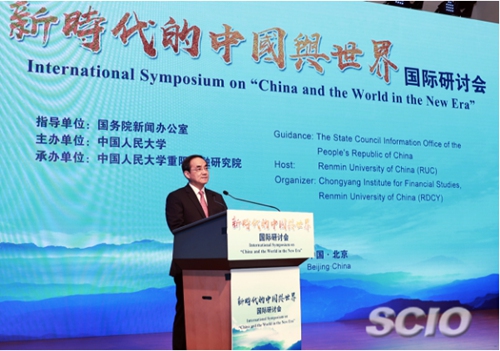HOME >> CHINA
China insists on open and peaceful development route in new era: senior official
Source:Global Times Published: 2019/12/17 22:08:40

Xu Lin, deputy head of the publicity department of the Communist Party of China (CPC) Central Committee and director of the State Council Information Office, speaks at a symposium in Beijing themed "China and the World in the New Era." Photo: Courtesy of SCIO
China will maintain its open and peaceful strategic development path in the new era and strive to make a greater contribution to the world, a senior Chinese official said at a symposium on Monday when sharing ideas of understanding China from a historical, cultural, development and world view.
Xu Lin, deputy head of the publicity department of the Communist Party of China (CPC) Central Committee and director of the State Council Information Office, made the remarks on Monday at a symposium in Beijing themed "China and the World in the New Era."
Dozens of guests from home and abroad including former political leaders, diplomatic envoys to China, business leaders, experts and scholars, attended the event.
Xu proposed six features of China in the new era at the event from the perspectives of history, culture, development and the world.
First, Xu suggested that China in the new era presented itself as a self-dependent and self-thriving country. China achieved a great leap from extreme poverty and weak industrial and agricultural conditions in the early days of the new China to the status of the world's second largest economy today. For a country with a 1.4 billion population, fighting on its own was the only way out, said Xu.
He then confirmed that for China in the new era, people's well-being has long been the core mission of the Chinese government and the CPC.
From 1978 to 2018, the incidence of extreme rural poverty in China dropped by 95.8 percentage points from 97.5 percent to 1.7 percent, creating a miracle in the history of extreme poverty reduction.
Xu moreover stated that openness was the hallmark of contemporary China, as opening-up has brought China capital, advanced technology and managerial expertise. It has also provided a vast market for other countries, satisfied the demand for products on the international market and promoted a more rational allocation of global resources.
China will never stop pursuing reform and innovation, especially during a time when the world is facing rising unilateralism and protectionism, Xu said.
From an international perspective, Xu said China in the new era is firmly committed to the path of peaceful development.
Over the past 70 years, China has never initiated a war or conflict, nor has it invaded a single inch of other countries' land, Xu asserted.
Since reform and opening-up, China has taken the initiative to reduce the number of military personnel by over 4 million, he said.
China is an active participant in UN peacekeeping operations, the second largest financial contributor to those operations and the largest provider of troops among the UN Security Council's five permanent members.
Since China joined UN peacekeeping operations in 1990, 13 Chinese soldiers have died on the front line, Xu said.
Xu argued that some people have put forward a "China threat" theory based on the rapid development of China, which reflected a cognitive misreading and deep-rooted prejudice. "The Chinese Dream is not a dream of hegemony," Xu said.
China in the new era will make a greater contribution to the world, Xu said, referring to China as a major stabilizer and engine of world economic growth.
By August, the Chinese government had signed 195 cooperation documents with 136 countries and regions and international organizations.
China could lift 32 million people out of moderate poverty - those who live on less than $3.20 a day, according to a World Bank study.
"We welcome foreign friends to visit China more often, to learn more about the real and comprehensive China, and introduce what they have seen and heard in China to the world in an objective and comprehensive way," Xu said at the conclusion of the speech.
Global Times
RELATED ARTICLES:
Posted in: DIPLOMACY